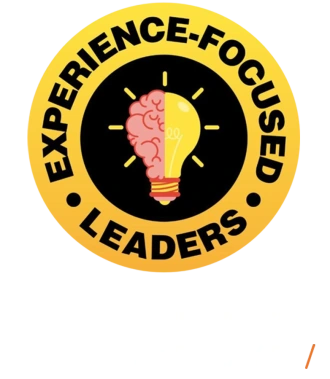Listen to the Podcast Episode on Your Favorite Platform

.svg.png)

Intrapreneurship Driving Corporate Innovation
.png)
You're gonna learn knowledge from being an intrapreneur. You're going to have those experiences that you can take on the rest of your career with you (RJ Grimshaw).
(00:01-04:57)
Welcome to Experience-Focused Leaders! RJ Grimshaw, CEO of Unified Equipment Finance, joins host Alex Shevelenko to explore the world of intrapreneurship. They dive into the impact of entrepreneurial minds thriving within established organizations.
RJ defines intrapreneurship as an entrepreneurial mindset within a company's structure—a business within a business. He shares how Unified Equipment Finance developed an 'Intrapreneur Operating System' (IOS) that encourages calculated risks, driving tremendous growth.
They discuss RJ's journey from young entrepreneurship to seamlessly transitioning into corporate America as an intrapreneur.
.png)
A culture centered on purpose and impact
.png)
You see the engagement goes up tremendously. And the simple reason why is that these intrapreneurs and the team members feel valued because their voices are heard. They feel that they're adding value to the organization. So, there has to be alignment between the intrapreneur and the mission vision of that founder. If that aligns, it becomes extremely special (RJ Grimshaw).
(04:58-10:22)
Alex Shevelenko and RJ Grimshaw discuss how to encourage an entrepreneurial spirit in both startups and larger corporations.
Alex sheds light on the environment at RELAYTO, where a team of founders drives a culture centered on purpose and impact. They explore the significance of risk-taking and the fulfilling aspect of contributing to the creator economy.
RJ emphasizes the positive impact of intrapreneurship on employee engagement in larger companies. The individual initiatives have to be aligned with the organization's mission and vision.
They discuss innovative hiring approaches, like the "internpreneur" role, where individuals are given ownership to contribute meaningfully, attracting those genuinely committed to making an impact.
Alex talks about the mission-driven culture at RELAYTO in encouraging enthusiasm and dedication among the team, emphasizing the need to align execution with the overarching mission.
.png)

Key traits that define an intrapreneur
.png)
There are really five things to look for in an intrapreneur. From a basic high-level perspective, it's really an ownership mentality of their responsibilities, which means they're held accountable, and they're fine with that. They're a life learner, a person that's always trying to learn on a daily basis. They take calculated risks. And then they have a drive to spark change (RJ Grimshaw).
(10:23-14:45)
RJ praises Alex for his innovative job descriptions, which have attracted higher-quality candidates. They banter about how job roles with tough execution demands quickly filter out those who might overestimate their abilities, especially among eager newcomers hoping to dive into entrepreneurship.
The discussion emphasizes how the work environment swiftly exposes individuals’ ability to deliver results.
RJ shares key traits that define an intrapreneur within an organization: an ownership mindset, continuous learning, passion, calculated risk-taking, and a drive to innovate or improve. He highlights the need for balance, stating that not everyone needs to embody all intrapreneurial characteristics for a company to succeed.
.png)
If every team member could be a founder
.png)
The biggest investment we all make is in the people that we're surrounding ourselves with (RJ Grimshaw).
(14:46-17:35)
RJ breaks down team functionality into three levels:
• Level one, the functional employees.
• Level two, the budding process creators.
• Level three, the vital intrapreneurs solving problems and scaling systems across departments.
RJ highlights the critical investment in the right team members. They challenge the misconception of every team member being a founder, advocating for a mix of complementary talents with shared values.
.png)

The challenges of finding the right candidates
.png)
There's a simple rule of thumb that I've always used when hiring people. Would I go to dinner with this person and enjoy a couple of hours with them? If the answer is yes, then that's one of the barriers (RJ Grimshaw).
(17:36-23:03)
RJ lays out his criteria for evaluating candidates, stressing values like trustworthiness and effective communication. He humorously mentions his dinner litmus test for potential hires, emphasizing the need for authentic rapport beyond qualifications.
They dive into RJ's intriguing interview question: "If money wasn't a factor, what's your dream job?" This question, they discuss, reveals a person's true passions and motivations, sometimes eliciting deeply personal responses.
They ponder the ethical side of hiring, leaving a positive mark even on candidates who might not fit the role. Alex highlights the value of offering a positive experience, irrespective of the hiring outcome.
They explore both selecting suitable candidates and respectfully communicating outcomes to all applicants, aiming to create a positive impression throughout the hiring journey.
.png)
Balancing career aspirations within realistic constraints
.png)
When you deploy the Intrapreneur Operating System, you're going to reduce your turnover. Because people are again back to engagement, they feel their value, and they don't want to leave the company (RJ Grimshaw).
(23:04-31:06)
RJ emphasizes how implementing an "intrapreneur operating system" significantly boosted engagement and slashed turnover rates at UniFi.
Their conversation unfolds around balancing career aspirations within realistic constraints. RJ’s story about hiring a Red Wings pro reveals how a solid entrepreneurial mindset can drive transformative change.
They dig into the challenge of larger companies straying from their customers while trying to innovate internally. Discussing the risk of “innovation theater”, they stress the need for a customer-centric approach to stay connected to customer needs, especially in big corporations.
Both RJ and Alex encourage employees to recognize themselves as entrepreneurs, valuing their unique contributions. They advocate for self-awareness in understanding one’s worth within a company.
.png)

Create an environment where everyone's voice counts
.png)
There's been a recent survey by Bain & Company. They found that the companies with an entrepreneurial culture had a 30% higher net promoter score (RJ Grimshaw).
(31:07-41:31)
RJ stresses that when folks can freely pitch ideas, companies end up with happier customers. He's all about the regular workers contributing gold when they feel listened to and respected.
Alex spotlights how those on the front lines often have the best ideas because they're right there with the customers. Making sure everyone feels part of the big picture is key, he says.
They go deep into how innovation initiatives are communicated. RJ's big on making sure the message matches the delivery, stressing the need for leaders to be fully committed to a long idea-sharing journey.
They both agree that being clear about decisions and highlighting small wins can help cheer up those whose ideas didn't take off.
.png)
Recognize failure as a learning opportunity
.png)
We have that in our mind, in our business plan, that 20% of ideas will flop, and we're OK with that (RJ Grimshaw).
(41:32-46:24)
Have a clear plan when deploying ideas and advocate for a focused approach to gain momentum. Not all ideas will strike gold, but the lessons will be learned from failures.
Alex shares personal insights about embracing failure, especially transitioning from an academic achiever mindset to the uncertainties of the corporate world. The speakers discuss the delicate balance between recognizing failure as a learning opportunity while avoiding it due to basic mistakes or lack of research.
RJ sheds light on how different business stages impact risk and the role of an entrepreneur within those phases. He talks about customizing entrepreneurial initiatives to fit a company's culture and resonate with its team.
.png)

The story of UniFi's transformation
.png)
We had to make an educated decision: who we are, where we want to go, and who we are going to say no to. Because we can't serve all. By serving all, we're actually hurting the value that we bring (RJ Grimshaw).
(46:25-56:17)
Alex and RJ dive deep into how different businesses and industries manage risks. They chat about how risk profiles change as a company grows and how certain industries demand bold bets while others thrive on a portfolio strategy.
RJ shares a story about UniFi's transformation—imagine a restaurant that serves everything, but then they realized they couldn't scale like that. So, they made a decision, became a "steak shop," and that move pushed their business to the next level.
Alex connects the dots, talking about how entrepreneurs have this knack for making customers happy and how that creates a fantastic environment for everyone involved. RJ jumps in, highlighting how entrepreneurs are driven by love for what they do, not just money, comparing them to athletes chasing the glory of winning.
.png)
Check the the episode's Transcript (AI-generated) HERE.
Other Episodes

Godard Abel | CEO of G2
S 01 | Ep 6 Where You Go for Software: Reach Your Peak


Dean Stocker | CEO of Alteryx
S 01 | Ep 8 Turning Your Customers Into Your Biggest Champions


Peter Fader | Co-Founder of ThetaCLV
S 01 | Ep 10 Turning Your Marketing Into Dollars

Author

Experience-focused Leaders is the #1 Multimedia Podcast! We talk to senior business & tech leaders about the experiences that move forward organizations, customers and society at large. True to form, we mix audio, video, web and eBook formats to turn these authentic conversations into personalized nuggets you'll remember & use.



.png)
